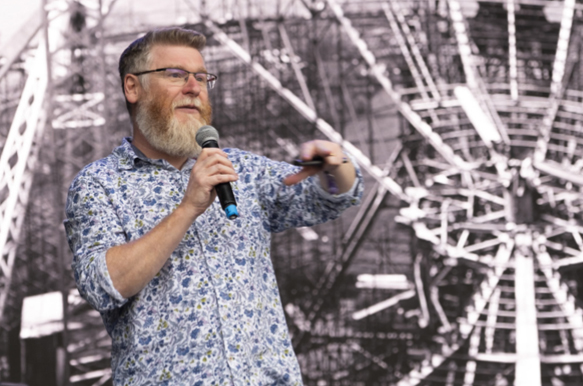All About Futures NEWS

IOP: Physics Teacher Conference & Workshops
Calling all Physics Teachers! Don’t miss your chance to take part in the Institute of Physics Teacher Conference, take a look at the fantastic lectures & workshops on offer. Places are limited – reserve your tickets now!
Location: Daresbury Laboratory Sci-Tech
(Daresbury Blue Zone) Keckwick Lane WA4 4AD
Date: Thursday 27 June 2019
Time: 9:30 – 15:30
To reserve your place or request further details please email Andrea Fesmer, IOP Teacher Network coordinator for Merseyside.
Lecture: One Giant Leap: Jodrell Bank and the race to the Moon:
July 2019 will mark fifty years since humans first set foot on another celestial body. In the run up to the anniversary, Professor Tim O’Brien will tell the story of Jodrell Bank’s role in the race to the Moon.
This entertaining presentation will include audio-visual material from Jodrell Bank’s archive and feature aspects of both the American and Russian space programmes.
Professor Tim O’Brien (Professor of Astrophysics and Associate Director of Jodrell Bank Observatory)
Workshop sessions:
A) GCSE physics practical (1hr) sessions 2 and 3 – Helen Pollard and Dan Cottle (IOP)
An opportunity to try all of the GCSE practicals, or concentrate on just one or two, if you prefer. We will identify and discuss different skills assessed through practical work and alternative equipment/set-up. As the use of Vernier scales is now explicit in the specification, we will cover reading Vernier calipers and micrometers.
B) Inside the Atom (1hr) session 1 – Phill Day – (Daresbury Laboratory)
This workshop will cover how matter and antimatter can turn into pure energy and vice versa, that particles smaller than an atom have to be observed indirectly and how we found out what is inside the atom. As well as providing background on CERN and the Large Hadron Collider, the workshop provides teachers with an engaging hands on activity to run with pupils that is analogous to accelerator experiments that use the results of collisions to deduce properties of unseen objects. This process simulates the experiments pioneered by Ernest Rutherford and his team, which are still used by nuclear and particle physics today. (KS 4 and 5)
C) What makes good CPD? (1hr) session 2 – Gary Williams (IOP)
Whether you’re giving or receiving, we all want effective continuing professional development. The IOP Teacher Network has created an infrastructure to provide CPD across the UK and ROI. Now it needs to develop to be more effective. In this workshop we’ll present what we already know about good CPD, what the literature says, and we’ll discuss what participants think we should be aiming for. (Suitable for all Key Stages)
D) Daresbury General Tour (1hr) session 2
Daresbury Laboratory is a hub for pioneering scientific research. Its key activities include Particle Accelerator research and development, Nuclear Physics and Scientific Computing. This tour will take teachers behind the scenes at the lab, and demonstrate the opportunities that some of the facilities on site can offer to the future of scientific research and development. A more basic general tour. (Suitable for KS 3 and 4)
E) Daresbury Specialist Tour (1hr) session 3
Daresbury Laboratory is a hub for pioneering scientific research. Its key activities include Particle Accelerator research and development, Nuclear Physics and Scientific Computing. This tour will take teachers behind the scenes at the lab, and demonstrate the opportunities that some of the facilities on site can offer to the future of scientific research and development. Suitable for the specialist physics teacher (KS 4 and 5)
F) Maths for Physics: How do you solve a problem? (1hr) session 1 – Graham Perrin (IOP)
Why can’t they JUST plot a graph, change the subject, find the average…when they can do all this in maths? There are underlying issues with confidence and transferability of maths skills that seem to hold many students back in physics. As a science teacher you may find yourself teaching them the maths every time, but what can we do to bridge the gap between the maths room and the science lab? Are there links across science topics that we don’t get a chance to exploit? We’ll look at strategies to help you best support your students’ learning and review the bigger picture in your schools. (KS 3,4,5)
G) Increasing the number of girls to number of boys to get the right number of physicists (1hr) session 3 – Sasa Harper (IOP)
Using evidence based research, looking at how tackling stereotypes is the most effective when used in a whole school approach.
H) Rope and pizza models of electric circuits (1 hr) session 3 – Paul Cass (IOP)
How can you make the unseen rules of electric circuits more tangible and understandable for your students just using a rope or by talking about pizza? (Suitable for KS 3 and 4)
I) Bringing the Universe into the classroom (1 hr) sessions 1 and 3 Professor Andy Newsam (Director of NSO, Astrophysics Research Institute, Liverpool John Moores University)
Large, remote, robotic telescopes give the opportunity for you and your students to take your own research-quality observations. Here, after an introduction to the range of telescopes available to UK schools, you will learn how to get observations through the National Schools’ Observatory, and how to work with the data to produce images, make measurements and discoveries.
J) Waves to GCSE (1hr) session 1 – David Farley (IOP)
The session will look at the development of some of the key concepts involved with teaching waves to GCSE, including the electromagnetic spectrum. There will be demonstrations and classroom hints and tips to help students over the conceptual barrier posed by some of the ideas in this topic. (Suitable for KS 3 and 4)
K) Electricity and magnetism – finding engaging contexts (1hr) session 2 – Daisy Fox (IOP)
This workshop will support teaching the fundamental ideas of teaching electromagnetism in KS 3 and 4. Includes practical classroom tips and advice to engage students and highlight the relevance of electromagnetism in everyday life.
L) Rocket launchers Make and Take (2 hours) both session 1 and 2 (Maximum 20 people) Phil Furneaux (IOP) and Richard Bonella (IOP)
Build your very own compressed air “rocket” launcher (well, projectile launcher really). Ideal for science investigations and a wow with children of all key stages, including adult-age children! This launcher uses rockets that pupils can make out of paper, there’s no charge for the launcher which you can take away when you’ve built it, and there’ll also be a CD of resources to use with the equipment.
Event summary:
The conference is free for anyone who teaches physics at any level or who is interested in physics education. The costs for the conference are met by the IOP and Daresbury Laboratory kindly hosts the event.
Image credit: STFC

The Big Bang North West 2019: FULLY BOOKED!
Big Bang North West: New Headline Sponsor – Unilever!
Metro Mayor Opens Big Bang Competition Awards Ceremony 2018
The Big Bang North West 2018: Your AMAZING Feedback!
The Big Bang North West 2018: Official Gallery
The Big Bang North West 2018: Big Bang UK Competition Project
Follow All About STEM on Twitter here
Like All About STEM on Facebook
Follow The Big Bang North West on Twitter here
Like The Big Bang North West on Facebook

